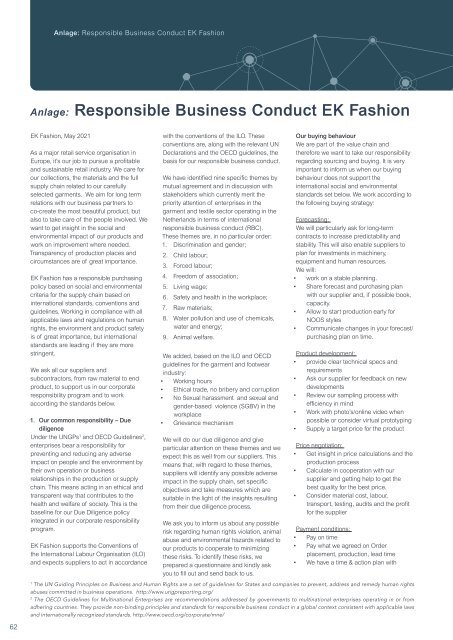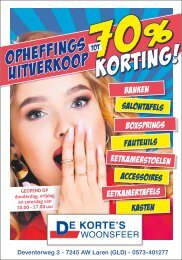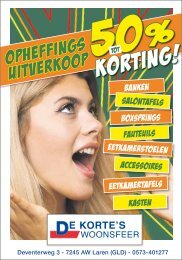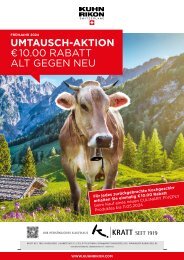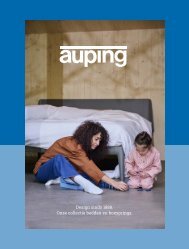EK Fashion ESG-Jahresbericht 2021
EK Fashion ESG-Jahresbericht 2021
EK Fashion ESG-Jahresbericht 2021
Erfolgreiche ePaper selbst erstellen
Machen Sie aus Ihren PDF Publikationen ein blätterbares Flipbook mit unserer einzigartigen Google optimierten e-Paper Software.
Anlage: Responsible Business Conduct <strong>EK</strong> <strong>Fashion</strong><br />
Anlage: Responsible Business Conduct <strong>EK</strong> <strong>Fashion</strong><br />
<strong>EK</strong> <strong>Fashion</strong>, May <strong>2021</strong><br />
As a major retail service organisation in<br />
Europe, it’s our job to pursue a profitable<br />
and sustainable retail industry. We care for<br />
our collections, the materials and the full<br />
supply chain related to our carefully<br />
selected garments. We aim for long term<br />
relations with our business partners to<br />
co-create the most beautiful product, but<br />
also to take care of the people involved. We<br />
want to get insight in the social and<br />
environmental impact of our products and<br />
work on improvement where needed.<br />
Transparency of production places and<br />
circumstances are of great importance.<br />
<strong>EK</strong> <strong>Fashion</strong> has a responsible purchasing<br />
policy based on social and environmental<br />
criteria for the supply chain based on<br />
international standards, conventions and<br />
guidelines. Working in compliance with all<br />
applicable laws and regulations on human<br />
rights, the environment and product safety<br />
is of great importance, but international<br />
standards are leading if they are more<br />
stringent.<br />
We ask all our suppliers and<br />
subcontractors, from raw material to end<br />
product, to support us in our corporate<br />
responsibility program and to work<br />
according the standards below.<br />
1. Our common responsibility – Due<br />
diligence<br />
Under the UNGPs 1 and OECD Guidelines 2 ,<br />
enterprises bear a responsibility for<br />
preventing and reducing any adverse<br />
impact on people and the environment by<br />
their own operation or business<br />
relationships in the production or supply<br />
chain. This means acting in an ethical and<br />
transparent way that contributes to the<br />
health and welfare of society. This is the<br />
baseline for our Due Diligence policy<br />
integrated in our corporate responsibility<br />
program.<br />
<strong>EK</strong> <strong>Fashion</strong> supports the Conventions of<br />
the International Labour Organisation (ILO)<br />
and expects suppliers to act in accordance<br />
with the conventions of the ILO. These<br />
conventions are, along with the relevant UN<br />
Declarations and the OECD guidelines, the<br />
basis for our responsible business conduct.<br />
We have identified nine specific themes by<br />
mutual agreement and in discussion with<br />
stakeholders which currently merit the<br />
priority attention of enterprises in the<br />
garment and textile sector operating in the<br />
Netherlands in terms of international<br />
responsible business conduct (RBC).<br />
These themes are, in no particular order:<br />
1. Discrimination and gender;<br />
2. Child labour;<br />
3. Forced labour;<br />
4. Freedom of association;<br />
5. Living wage;<br />
6. Safety and health in the workplace;<br />
7. Raw materials;<br />
8. Water pollution and use of chemicals,<br />
water and energy;<br />
9. Animal welfare.<br />
We added, based on the ILO and OECD<br />
guidelines for the garment and footwear<br />
industry:<br />
• Working hours<br />
• Ethical trade, no bribery and corruption<br />
• No Sexual harassment and sexual and<br />
gender-based violence (SGBV) in the<br />
workplace<br />
• Grievance mechanism<br />
We will do our due diligence and give<br />
particular attention on these themes and we<br />
expect this as well from our suppliers. This<br />
means that, with regard to these themes,<br />
suppliers will identify any possible adverse<br />
impact in the supply chain, set specific<br />
objectives and take measures which are<br />
suitable in the light of the insights resulting<br />
from their due diligence process.<br />
We ask you to inform us about any possible<br />
risk regarding human rights violation, animal<br />
abuse and environmental hazards related to<br />
our products to cooperate to minimizing<br />
these risks. To identify these risks, we<br />
prepared a questionnaire and kindly ask<br />
you to fill out and send back to us.<br />
Our buying behaviour<br />
We are part of the value chain and<br />
therefore we want to take our responsibility<br />
regarding sourcing and buying. It is very<br />
important to inform us when our buying<br />
behaviour does not support the<br />
international social and environmental<br />
standards set below. We work according to<br />
the following buying strategy:<br />
Forecasting:<br />
We will particularly ask for long-term<br />
contracts to increase predictability and<br />
stability. This will also enable suppliers to<br />
plan for investments in machinery,<br />
equipment and human resources.<br />
We will:<br />
• work on a stable planning.<br />
• Share forecast and purchasing plan<br />
with our supplier and, if possible book,<br />
capacity.<br />
• Allow to start production early for<br />
NOOS styles<br />
• Communicate changes in your forecast/<br />
purchasing plan on time.<br />
Product development:<br />
• provide clear technical specs and<br />
requirements<br />
• Ask our supplier for feedback on new<br />
developments<br />
• Review our sampling process with<br />
efficiency in mind<br />
• Work with photo’s/online video when<br />
possible or consider virtual prototyping<br />
• Supply a target price for the product<br />
Price negotiation:<br />
• Get insight in price calculations and the<br />
production process<br />
• Calculate in cooperation with our<br />
supplier and getting help to get the<br />
best quality for the best price.<br />
• Consider material cost, labour,<br />
transport, testing, audits and the profit<br />
for the supplier<br />
Payment conditions:<br />
• Pay on time<br />
• Pay what we agreed on Order<br />
placement, production, lead time<br />
• We have a time & action plan with<br />
1<br />
The UN Guiding Principles on Business and Human Rights are a set of guidelines for States and companies to prevent, address and remedy human rights<br />
abuses committed in business operations. http://www.ungpreporting.org/<br />
2<br />
The OECD Guidelines for Multinational Enterprises are recommendations addressed by governments to multinational enterprises operating in or from<br />
adhering countries. They provide non-binding principles and standards for responsible business conduct in a global context consistent with applicable laws<br />
and internationally recognized standards. http://www.oecd.org/corporate/mne/<br />
deadlines for all contributors (buyer and<br />
supplier)<br />
• We agree on realistic lead time<br />
• We make an agreement on late style/<br />
order changes<br />
• We work on understanding the local<br />
and cultural differences<br />
2. Social & Environmental Compliancy<br />
The responsible business conduct aims to<br />
attain compliance with certain standards.<br />
Supplier companies, in addition, must<br />
ensure that the responsible business<br />
conduct is also observed by subcontractors<br />
involved in production processes of final<br />
manufacturing stages. Within the scope of<br />
options for action and appropriate<br />
measures, supplier companies have to aim<br />
at the implementation and reporting of the<br />
following criteria in a development<br />
approach. <strong>EK</strong> <strong>Fashion</strong> declares that we will<br />
only work directly with subcontractors 3 that<br />
are prequalified through the same rigorous<br />
processes to those used for direct<br />
contractors. Approved subcontracts may<br />
be reviewed on a semi-regular (e.g. annual)<br />
basis to remain approved. Workers of those<br />
sub-contractors should have access to<br />
grievance mechanisms, similar to those of<br />
direct contractors. We ask for transparency<br />
to know where our products are made and<br />
to be able to ask questions regarding social<br />
and environmental conditions.<br />
2.1 Social Compliancy<br />
Below written the most important ILO<br />
conventions related to human rights at the<br />
work floor.<br />
Prohibition Child Labour and working<br />
conditions of young workers ILO<br />
Conventions 10, 79, 138, 142 and 182 and<br />
Recommendation 146.<br />
There shall be no use of child labour. “The<br />
age for admission to employment shall not<br />
be less than the age of completion of<br />
compulsory schooling and, in any case, not<br />
less than 15 years.” “There shall be no<br />
forms of slavery or practices similar to<br />
slavery, such as the sale and trafficking of<br />
children, debt bondage and serfdom and<br />
forced or compulsory labour. [...] Young<br />
workers [in the age of 15-18] shall not<br />
perform work which, by its nature or the<br />
circumstances in which it is carried out, is<br />
likely to harm their health, safety or morals.”<br />
Children and young persons under 18 shall<br />
not be employed at night or in hazardous<br />
conditions.<br />
Where young workers are employed,<br />
business partners should ensure that the<br />
kind of work is not likely to be harmful to<br />
their health or development; their working<br />
hours do not prejudice their attendance at<br />
school, their participation in vocational<br />
orientation approved by the competent<br />
authority or their capacity to benefit from<br />
training or instruction programs.<br />
Business partners shall set the necessary<br />
mechanisms to prevent, identify and<br />
mitigate harm to young workers; with<br />
special attention to the access young<br />
workers shall have to effective grievance<br />
mechanisms and to Occupational Health<br />
and Safety trainings schemes and<br />
programmes.<br />
Child Labour Due Diligence Bill<br />
By signing this RBC you take part in our<br />
Due Diligence Policy and you approve that<br />
you will do anything you can to identify,<br />
prevent and if necessary address the issue<br />
of child labour in our supply chain.<br />
We need to comply with the Dutch Law on<br />
Child labour Due Diligence on combating<br />
child labour in global supply chains, that<br />
comes into force as of January 2020. Dutch<br />
companies and their supply chain business<br />
partners will have to declare that they have<br />
addressed the issue of child labour in their<br />
supply chains. This law requires companies<br />
to identify, prevent and if necessary<br />
address the issue of child labour in their<br />
supply chains. We ask our suppliers to<br />
cooperate and be transparent about subcontractors<br />
and sub-suppliers and possible<br />
risks within the supply chain of our products<br />
so we can cooperate in combating child<br />
labour. Risk studies show that the severe<br />
risks are mainly at cotton farming and wet<br />
processing (like spinning mill) stage.<br />
<strong>EK</strong> <strong>Fashion</strong>’s <strong>ESG</strong> Manager, needs to be<br />
informed in high risk situations, for example<br />
when cotton comes from countries or<br />
facilities where forced labour is required<br />
and so the risks on child labour occurs. Ask<br />
your suppliers about their social<br />
management systems, latest audit reports<br />
or certifications like WRAP, SA 8000, Fair<br />
Trade, GOTS, Better Cotton or Organic<br />
Content Standard, or any other standard<br />
that entails Child labour.<br />
Prohibition of Forced and compulsory<br />
Labour and Disciplinary Measures ILO<br />
Conventions 29 and 105.<br />
There shall be no use of forced, including<br />
bonded or prison, labour. All forms of<br />
forced labour, such as lodging deposits or<br />
the retention of identity documents from<br />
personnel upon commencing employment,<br />
are forbidden as is prisoner labour that<br />
violates basic human rights.<br />
Prohibition of Discrimination ILO<br />
Conventions 100, 111, 143, 158, 159, 169<br />
and 183.<br />
No discrimination shall be tolerated in hiring,<br />
remuneration, access to training, promotion,<br />
termination or retirement based on gender,<br />
age, religion, race, caste, birth, social<br />
background, disability, ethnic and national<br />
origin, nationality, membership in workers’<br />
organisations including unions, political<br />
affiliation or opinions, sexual orientation,<br />
family responsibilities, marital status, or any<br />
other condition that could give rise to<br />
discrimination.<br />
No Sexual harassment and sexual and<br />
gender-based violence (SGBV) in the<br />
workplace<br />
Our business partners are encouraged to<br />
adopt a zero-tolerance policy on sexual and<br />
gender-based violence and strict measures<br />
against sexual harassment in its own<br />
operations. The enterprise should articulate<br />
its expectations of suppliers and other<br />
business partners to likewise adopt a policy<br />
3<br />
Subcontracting to third parties is a fairly common practice at many stages of the garment supply chain. Subcontracting enables an enterprise to respond<br />
quickly to short lead times and changes in orders, to specialize in certain tasks. Outsourcing, however, can also decrease transparency in the supply chain<br />
and has been demonstrated to increase the risk of human rights and labour abuses and environmental impacts in higher-risk contexts. Therefore the due<br />
diligence measures that <strong>EK</strong> <strong>Fashion</strong> should take to mitigate these risks should be increased. Source: OECD due diligence guide<br />
62 63


